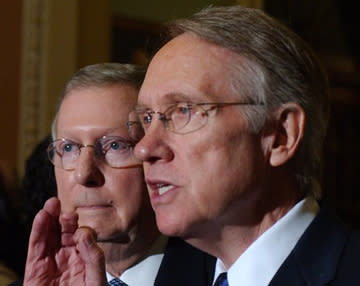 The Ticket
The TicketCongress spars over payroll tax-cut extensions: What does it mean for you?

Senate Democrats on Monday introduced an altered proposal to extend payroll tax cuts ahead of their expiration Dec. 31. But it's far from clear whether the Senate proposal can break the current stalemate over the issue in Washington.
At stake is a temporary tax break that affects nearly every employed American-- an estimated 160 million people, according to the White House. The break lowers the Social Security payroll tax for employees from 6.2 percent to 4.2 percent. But the provision is set to expire Dec. 31--meaning that if Congress fails to pass an extension, workers will be paying 2 percent more in Social Security taxes in the year head. That higher rate works out to an average of $1,000 for a typical middle-class family, according to the White House. Democrats are trying to couple their proposal payroll-tax cut with a similar extension of federal unemployment benefits, which are likewise set to expire at year's end.
The Democrats' plan will reportedly propose a further payroll tax reduction from 4.2 to 3.1 percent. The official plan had not yet been released as of Monday afternoon.
President Obama on Monday warned lawmakers to extend payroll tax cuts and unemployment benefits--or else risk hurting American families during the holiday season.
"It would be a terrible mistake for Congress to go home for the holidays" without extending unemployment insurance and leave "1.3 million Americans out in the cold," Obama said at a White House news conference.
Watch video of the president's press conference below:
Democrats and select Republican leaders such as Senate Minority Leader Mitch McConnell (R-Ky.) have voiced support for extending the payroll tax cut, but the parties have failed to find common ground about how the government would go about paying for it.
The new Democratic proposal unveiled Monday by Senate Majority Leader Harry Reid of Nevada included a plan that had been a past sticking point for Republicans--a surtax on Americans earning more than $1 million. But Reid said Democrats have now agreed to make that surtax temporary in order to corral some Republican support.
"The scaled-back, temporary tax on the very richest Americans—a group with an average income of $3 million a year—is also a sincere attempt to get Senate Republicans on board," Reid said in a Senate floor speech Monday afternoon, according to prepared remarks.
Reid argued that wealthy earners, a supermajority of Republicans, plus a majority of the tea party all support having the country's top income earners pay more in taxes. "Republicans in Congress dismiss [this temporary tax] at their peril. The American people are watching," Reid warned.
To drive that point home, the White House on Monday unveiled a timer available on the White House's website to count down the days until "middle class tax increases" take effect.
Democrats immediately depicted their new proposal as a "compromise" Monday, but Republican leaders countered that they had yet to see or judge the proposal before Democrats decided unilaterally to characterize it as a compromise.
Other popular Yahoo! News stories:
• Jobless in Iowa: a third of the state's unemployed have been looking for work for six months or more
• Herman Cain drops out of presidential race
• Newt Gingrich hits Iowa airwaves for the first time
Want more of our best political stories? Visit The Ticket or connect with us on Facebook and follow us on Twitter.
